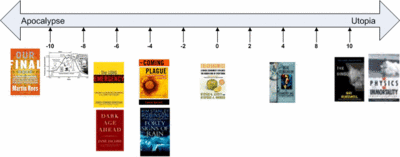
In a fit of inspiration, I extended the simple binary choice described in my previous post to a more fuzzy-logical view of the doom/boom or apocalypse/utopia continuum, and rate a bunch of books according to this scheme. -10 is doom, about as bad as it can possibly get, while +10 is some sort of utopia where we are all enjoying the unimaginable cornucopia of technofruits.
The selection of books is pretty arbitrary. It's mostly nonfiction though I threw some SF works into the mix. I couldn't think of much in the mid-range of the positive side of the axis; although I guess there are many reasonably sober books about near-future technology that would do.
Note that two of the books are so extreme that I had to go to -11 or +11. Also note that both of these were written by physicists.
Additions, adjusments, and corrections welcome.
-11: Martin Rees, Our Final Hour. Covers a variety of possible disasters, but earns the coveted last spot for mentioning the possibility that a physics experiment gone wrong could disrupt the fundamental structure of matter and space: "a hypothetical strangelet disaster could transform the entire planet Earth into an inert hyperdense sphere about one hundred meters across". And that's not even the worst scenario he offers.
-9: www.dieoff.org. Oil depleteion leads to complete collapse of industrial civilization. Billions die, and the remainder are living a stone-age existence. Referenced by Kunstler as people even more gloomy than he is.
-7: James Howard Kunstler, The Long Emergency. Oil depletion leads to a radical restructuring of society, mass dislocation, political shifts including the possible breakup of states. Lots of suffering, but culture continues in the form of self-sufficient local communities.
-7: Jane Jacobs, Dark Age Ahead. Cultural decline, we forget everything that makes us a civilization and revert to a starving peasantry.
-6: Kim Stanley Robinson, Forty Signs of Rain and its sequels. Global warming leads to heightened sea levels and geeral environmental collapse. The gulf stream stops but maybe it can be restarted.
-4: Laurie Garrett, The Coming Plague. Self-descriptive. This book is ten years old and maybe I should have used Mike Davis' new book with the even more panicky title.
-0.5: Steven Leavitt, Freakonomics. Actually this overhyped book is not very freaky and doesn't make much in the way of prognostications, but the author is here in honor of a blog post that basically says, peak oil will lead to a small price rise in oil, and the market will adapt, there's really no problem at all. Stands in for your typical detached-from-reality economist.
5: Neal Stephenson, The Diamond Age. Nanotech makes material goods basically free, but people are still people and social systems still have problems.
10: Ray Kurzweil, The Singularity is Near. Converging exponential trends in technology will result in an explosion of capabilities in AI, nanotech, and biotech wil make us all immortal, possibly reincarnated into immensly powerful computational hardware.
11: Frank Tipler, The Physics of Immortality. Not only will there be a singularity, but somehow the insanely powerful AI will resurrect everybody who has ever lived and grant them immortality and no doubt wings and a harp. Considered to be the worst science book written in recent years by an actual scientist, although I suppose some of the Intelligent Design crowd may be providing competition.
2 comments:
Cute graphic. I'm curious where you put Jared Diamond's "Collapse" in this model.
I found Diamond to be really struggling against all odds to be hopeful and positive, almost in spite of all the facts and case studies he offered, Maybe somewhere in the middle of your continuum.
Good question. I didn't include Diamond's book because it is mostly concerned with historical collapses, although it's cleearly intended to draw some lessons for today. The last chapter is called "Reasons for Hope", like you said, he's looking at the same type of systems collapses as the -4 authors but trying hard to be positive, so let's give him a -3.
Post a Comment